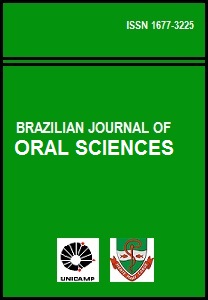Abstract
Aim: To evaluate and compare the perception of parents of children with and without disabilities about the occurrence of local and systemic manifestations during the eruption of primary teeth and to investigate the parents’ practices used to alleviate teething disturbances. Methods: A cross-sectional study was conducted in a sample of parents of children without disabilities (GI) and parents of children with disabilities (GII) treated at a University Pediatric Dentistry Clinic. Data from GI and GII were collected using a structured questionnaire applied during an interview with the parents, and were analyzed using descriptive statistics. Mann-Whitney and Wilcoxon tests were employed and the level of significance was set at p<0.05. Results: The questionnaires were filled out by 86 parents, being 45 in GI and 41 in GII. For GI, the most frequent local manifestations were edema around the tooth (84.44%) and increased suction (75.56%); and for GII were edema and erythema around the tooth (78.05% and 70.73%, respectively). The most frequent systemic manifestations, according to parents of both groups, were irritability and fever. There was no statistically significant difference between groups (p<0.05). It was observed that 46.66% and 68.3% of parents of GI and GII, respectively, adopted different practices to alleviate teething disturbances. Conclusions: During primary teeth eruption, local and systemic manifestations may occur and different practices were adopted by the Interviewed parents, mainly those with children with disabilities.
This work is licensed under a Creative Commons Attribution 4.0 International License.
Copyright (c) 2015 Alessandra Maia de Castro Prado, Fabiana Sodré de Oliveira, Ludmilla de Melo Abrão
Downloads
Download data is not yet available.

